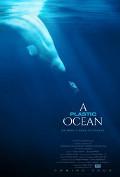
Directed by
Craig Leeson
102 minutes
Rated PG
Reviewed by
Bernard Hemingway

Plastic Ocean, A
Synopsis: A documentary looking at the impact of our use of disposable plastics on our environment and health.
In the beauty stakes Craig Leeson’s documentary is decidedly plain Jane but this doesn’t matter. What counts here is the message and it is one well worth paying attention to
The film opens with Australian journalist Leeson describing his childhood memories of his fascination with pictures of blue whales in a National Geographic magazine and this being the inspiration for now, forty years later, his filming the cetaceans in the Indian Ocean fifty miles off the coast of Sri Lanka. In the process he and his crew encounter a large slick of emulsified oil embedded with plastic detritus. And so begins A Plastic Ocean, in which Leeson and Tanya Streeter, a world record-breaking free diver and environmental activist, travel around the globe in a wide-ranging look at the deleterious effect on the environment and our health from our thoughtless use of disposable plastic in the form of shopping bags, drink bottles, food wrapping and so on.
Of course the statistics are depressing - hundreds of millions of tonnes of plastic products manufactured every year most of which is used only once and then thrown away, the bulk of it ending up in landfill or even worse in our oceans, where as we known marine life often choke or get tangled up in it. What you probably didn’t know is that over time these plastic products fragment into smaller “micro plastics” that when not killing outright the sea life, including birds, that ingest it, works its way into the food chain and eventually to our tables. And it’s not just that - the surface of the micro plastic acts as a host for other man-derived toxins in the ocean that bind to it.
Most of this plastic comes from underdeveloped countries like Sri Lanka, Indonesia and the Philippines that do not have proper waste disposal infrastructure but if you were thinking that your conscientious recycling activities absolve you of implication the film also looks at the way that toxins leached from plastic food containers, plastic-lined cans and drink bottles work their way directly into our bodies. That is setting aside cases as in parts of Fiji where, it seems, people use plastic bags as free cooking fuel!
A Plastic Ocean is not all doom and gloom. It looks at positive responses like a community reclamation project in the Philippines and a highly sophisticated German (of course) program for recycling plastic drink bottles, one that has effectively solved the plastic bottle litter problem. The key message is however that the real solution lies with minimizing our use of plastic. It is one well worth acting upon – for ourselves and for the marine life that has no choice in the matter.
One small area in which this documentary could have been improved is with sur-titles used to tell us who someone is or the meaning of some scientific term - they flash on the screen and off so quickly that it is often not possible to read them fully.

Want more about this film?


Want something different?




